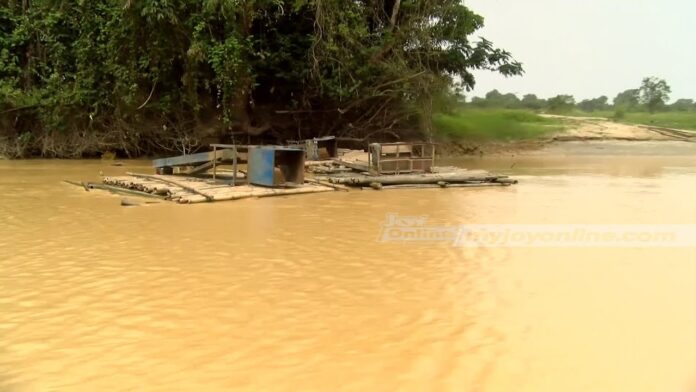Head of Research at the Danquah Institute, Dr. Frank Bannor has cautioned against a blanket ban on small-scale mining, arguing that such a move would have dire consequences for Ghana’s economy.
In an interview on Adom TV Badwam show on Wednesday, October 9, 2024, Dr. Bannor underscored the substantial contribution of small-scale mining to employment, economic growth, and Ghana’s foreign exchange reserves, emphasizing that banning it would undermine these critical sectors.
Small-scale mining’s role in employment and livelihoods
Dr. Bannor, who is also a lecturer at GIMPA noted that, the small-scale mining industry was a significant employer in Ghana, supporting millions of livelihoods, according to a 2016 United Nations Environment Programme (UNEP) report.
“We cannot underestimate the mining sector’s substantial contribution to the economy,” Dr. Bannor remarked.
The UNEP report highlights that over 1 million people are directly employed in small-scale mining, with approximately 4.5 million more depending on the sector for their livelihoods.
In comparison, he indicated that the large-scale mining sector employs just 8,760 people directly and supports 25,603 contractors, according to the 2020 Ghana Extractive Industries Transparency Initiative (GHEITI) report.
These stark differences in employment figures, he stressed, demonstrate that small-scale mining has a far-reaching impact on Ghana’s workforce, especially in rural areas where alternative employment opportunities are limited.
Mining and economic growth
Dr. Bannor further noted that small-scale mining has been instrumental in Ghana’s recent economic achievements. “The mining sector played a major role in Ghana’s impressive 6.9% economic growth in the second quarter of 2024,” he explained, pointing out that this was the fastest growth rate the country had seen in five years.
Data from the Ghana Statistical Service (GSS) shows that the mining and quarrying sub-sector was a key driver of this growth, with the industry sector recording a 9.3% expansion in the second quarter of 2024. Gold, in particular, was a standout performer, experiencing its third consecutive period of growth, with a remarkable 23.6% increase during the quarter.
Dr. Bannor emphasized that this growth was largely due to small-scale mining operations, which have consistently boosted Ghana’s gold output. The first quarter of 2024 had already seen a growth rate of 6.8% in the mining sector, demonstrating the sector’s crucial role in stabilizing the economy.
“When the industry sector is growing, it means more skilled labourers are finding jobs, which in turn helps expand the economy even further,” Dr. Bannor remarked, adding that nearly 19% of Ghana’s employment is tied to the industry sector.
Threat to Trade Surplus and Balance of Payments
The Economist warned that a blanket ban on small-scale mining would also jeopardize Ghana’s trade surplus and balance of payments.
He said, according to the Bank of Ghana, the country recorded a trade surplus of $1.81 billion in the first half of 2024, an increase from the $1.60 billion surplus recorded during the same period in 2023.
Dr. Bannor noted that this improved trade balance was largely driven by a significant rise in exports, especially gold and crude oil.
“In its Monetary Policy Report for the first half of 2024, the Bank of Ghana noted that total exports increased by $1.09 billion (13.4%) to $9.23 billion, with the value of gold exports rising by 46.4% to $5.04 billion. Small-scale mining contributed significantly to this growth, with the volume of gold exports increasing by 28.9% to 2.4 million ounces,” he added.
Dr. Bannor explained that a ban on small-scale mining would drastically reduce gold output, weakening the country’s trade surplus and worsening the balance of payments.
Impact on International Reserves and the Exchange Rate
Beyond trade figures, Dr. Bannor highlighted the potential impact of a small-scale mining ban on Ghana’s foreign reserves and currency stability. In August 2024, Ghana’s Gross International Reserves had increased by $1.58 billion to $7.50 billion, providing 3.4 months of import cover.
This increase was largely driven by the country’s domestic gold purchase program, which relies heavily on small-scale miners for gold supplies.
The trade balance for the first eight months of 2024 also recorded a surplus of $2.78 billion, up from $1.66 billion during the same period in 2023. The surplus was mainly due to the sharp rise in gold exports, which surged by 62.2% to $7.27 billion, and an increase in crude oil exports.
“Banning small-scale mining would significantly reduce gold exports, eroding the surplus and depleting our foreign reserves. This could put pressure on the cedi, leading to a further depreciation of the currency,” Dr. Bannor cautioned. He explained that a weakened currency would fuel inflation, raise the cost of imports, and strain the economy even further.
Balanced approach needed
He acknowledged the need to combat illegal mining, or “galamsey,” He called for a more nuanced approach to small-scale mining regulation.
“We need to distinguish between illegal mining and legitimate small-scale mining operations that comply with environmental and regulatory standards,” he said.
A blanket ban, he argued, would punish law-abiding operators and stifle an industry that has been a major pillar of Ghana’s economic growth. He urged policymakers to consider the broader economic implications of banning small-scale mining and to focus on solutions that would preserve the sector’s contributions while addressing illegal activities.
“It does not make economic sense to ban small-scale mining. The livelihoods of millions of Ghanaians, the stability of our economy, and the strength of our currency depend on this sector’s survival.”
Source: Bright Philip Donkor

